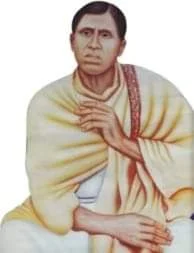the sacrifice of Sri Guru Gurchand Thakur's whole life, I am trying to raise my mind
Birth of Gurchand Tagore: - March 13, 1846;
Birthplace: Orakandi village of present Bangladesh, Kashiani, Gopalganj, Bangladesh.
Father: Harichand Thakur
Mother: Peace Mother.
Thakurda: Yashmantha Thakur.
Through the sacrifice of Sri Guru Gurchand Thakur's whole life, I am trying to raise my mind.
In 1872 there was a rebellion led by Matuya under the direction of Gurchand Tagore in Bengal demanding universal education. Therefore, the decision was announced to spread the newly introduced English education among the people of the district.
In 1881, a large awakening meeting was held at Dutdanga in Khulna district to mark the occasion of the Lord's House. Gurchand Tagore presided over the meeting.
In 1881 the Namasudra Welfare Association was formed in Khulna under the direction of Gurchand Tagore. Representatives of the then 22 districts of the organization joined. In 1906, the magazine "Namasudra Suhrid" started publishing under the direction of Gurchand Tagore. In 1908 a women's education training school was also established in Orakandi. During this time, maternal and child care was established for maternal and child care. Gurchand Tagore demanded from him for education, hostel and health center.
By March 1910 (Bangla 1316), in the month of celebrating the birth anniversary of Harichand Thakur (ie 13th March), the widow of the widow married in the fallen nation. And he ordered the child marriage to end.
In 1912, the fifth George Gurchand presented Tagore with a "Darbar Medal" for his service to the community.
Gurchand Thakur incorporated the name Namasudra in the official document instead of abducting Chandal in 1911. In the Lokganas, the Chandals in Bengal are identified as the Namasudra community and their thousand-year-old Chandal abusers were removed.
Following the announcement by the Department of Education in 1913, some public hostels were arranged to facilitate the study of students of Scheduled Castes of East Bengal.
By 1915, the public protection system for the underdeveloped people in Pirojpur, Barisal and Dhaka in East Bengal was fully operational.
A similar hostel was opened in Kolkata in 1918 and its management was entrusted to Kolkata University.
In 1919, the Montagu Chelmsford Reform Act announced that the preservation system of the underdeveloped would be spread to other Presidencies or provinces of India. Thus, the Matua movement led by Jugnad Gurchand Thakur secured education, jobs and law meetings all over India.
In 1921, at the behest of Gandhiji, Chittaranjan Das wrote a letter urging Gurchand Thakur to take part in non-cooperation movement. Gurchand Thakur replied that he did not want to join the movement.
In 1923, Gurchand Thakur presided over a conference that was held for the development of underprivileged people in Khulna district and gave a lengthy speech.
In 1926, "The Bengal Depressed Classes Association" was formed according to the decision of the Conference of the City of Khulna.
Originally in the Dhaka Division until 1931; It was possible to build 1067 special schools under the leadership of Gurchand Thakur for the reading of Namashudra boys and girls.
By 1931, there were 569 in the Presidency Division for the education of the children of the backward society, 246 in the growing division for the education of Santal or indigenous children and 1067 schools in Dhaka Division for the education of Namasudra children. So it appears that a total of 1882 schools were established.
In 1932, the Hari-Gurchand Mission was established in Orakandi and with the help of that mission a school was established for the education of women in the taluka of Orakandi.
From the historical speech that Datadanga Gurchand Thakur gave to the nation in 1881, the tide of education movement in the backward classes began to decline, and many of the high schools that were to be built towards the end turned into English and Upper English schools by 1890. . And in these schools, measures were also taken for the education of women.
Gurchand Thakur was elected superintendent on March 27 at the age of 91 in 1937.
Gurchand Thakur's Memorial Meeting was held on March 27, 1937, following the appointment of its predecessor to the education movement. The meeting was attended by Surendranath Banerjee, Netaji Subhas Chandra Bose and others.
Jai Gurchand.







Comments